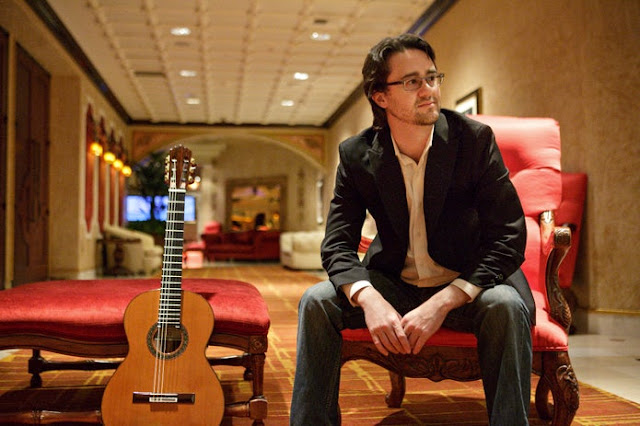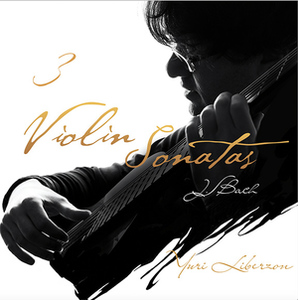Yuri has transcribed Bach's Partitas for unaccompanied violin for guitar, but he found that his teacher's transcriptions of the sonatas were perfect. Yuri did not have enough to say to do his own transcriptions, though he made small changes to Barrueco's transcriptions. One of the important things is that Barrueco keeps the original keys. When playing individual sonatas, guitarists sometimes alter the keys, but as soon as Yuri decided he was going to record all three he realised he needed to keep the key relationships.
Bach writes polyphonically for his solo violin, implying harmony and multiple voices by using double-stopping and string crossing. But a guitarist can play more notes simultaneously than a violinist can, so the question is, how much of the implied harmony to fill in? Yuri comments that some purists play Bach's original violin part on the guitar, adding nothing but he feels that there is room for the imagination to think what Bach might do, though he wants to add less of himself and to let the music speak for himself. How many extra notes he adds very much depends on the music, varying from work to work and even from movement to movement, but always asking what would Bach do?
The modern guitar is a Romantic instrument, it developed in the 19th century, so another question is how to approach the music, Romantic or Historically Informed? Yuri tries to stay away from over romanticising the music, yet he also wants to avoid fugues that are strict and emotionless. Balance is necessary, though he favours the more reserved approach. But he points out that the slow movements are often more like fantasias and there is more room here for freedom, for liberties, and even in the faster movements there is still an element of freedom as the player has a lot of say in how the music is phrased.
And there is a lot of Bach that can be explored on the guitar. When he was younger Yuri performed the lute suites and would love to return to them and transcribe them for guitar, and then there are the cello suites, and he has also played transcriptions for two guitars. He always goes back to Bach, the music centres him and elevates his mood. Yuri has had this Bach programme in mind for years. When he first came to the USA he heard Manuel Barrueco's recording of the sonatas and found it phenomenal. He hoped to record one of the sonatas and then went for all three. He feels the recording is a personal accomplishment.
Growing up, he loved Bach's music and did not understand Mozart, thinking that Mozart's music didn't have depth, But as Yuri got older he changed his mind, realising that Mozart was a genius yet different to Bach. It was an interesting journey for him to go on from not liking Mozart to loving him.
 |
| Yuri Liberzon |
The repertoire on the disc is, of course, music transcribed for guitar and the whole wider issue of guitar repertoire is a challenge. There are relatively few unalloyed masterpieces written for the guitar, and a guitarist needs to look either to works by lesser-known guitarist/composer (usually beloved of guitarists but hardly known to the wider public) or transcriptions of other repertoire. How to balance these is a difficult question, and Yuri feels that you need to be truthful. When planning repertoire he always asks himself do I really love the piece, is it meaningful, if the answer is no then he doesn't play it. He needs to believe in a piece to do it justice.
There is a small island of music that can be appreciated by a wide range of audience, whilst the more avant-garde music speaks to a select group. Then there is the very popular repertoire, everyone knows it; it is rather overdone and doesn't interest him. Yuri tends to go for music that is beautifully arranged, he mentions Toru Takemitsu's versions of Beatles songs which he calls mindblowing. Yuri likes to cross genres, rather than not limiting himself to classical. He finds cross-over genres versatile, and he feels at home.
Whilst he likes music written for the guitar, Yuri feels that when a guitarist writes for the guitar they are already limited. It is when a composer thinks of something impossible and makes it possible that the magic happens.
Yuri was born in Russia and grew up in Israel, neither of which is known for the guitar. But Yuri's father played the guitar, a Russian seven-string one on which he played Russian romances. And Yuri gravitated to the instrument, and as a child, he had tapes of guitarists. He feels that the biggest influence on him was not a particular culture but the experience of migrating and starting over. This made him ask questions such as what am I about, what do I want to do? And this pushed him.
In fact, his next project is a contemporary Russian composer. Yuri is recording a disc of music by Konstantin Vassiliev for Naxos. Vassiliev is from Siberia, near where Yuri was born, but lives in Germany and Yuri describes his music as jazz-influenced.
 |
| Yuri Liberzon |
At the age of five, Yuri's mother took him to a music school where he did a little exam, and they said he could play violin or piano, but he burst into tears saying he wanted to play the guitar. The guitar teacher did not take pupils under the age of nine, but he made an exception, and they found a small guitar, with steel strings (Yuri describes it as factory-made and bad!). His teacher would write melodies for Yuri to play, this got him going, he found it inspiring. Later he switched teachers, and the new one was far more strict, emulating Segovia, and then Yuri moved to Israel. The thought of changing instruments never entered his mind, he is in love with the instrument. The only other instrument that he enjoys is the violin, admiring the amount of detail in each note, the tone, the vibrato. And in fact, he was jealous, in an admiring way, of Bach's Partitas and Sonatas for unaccompanied violin.
His heroes start with guitarists Andres Segovia and John Williams. Yuri comments that this latter has recorded everything. Later, his teacher Manuel Barrueco became a strong influence, his aesthetics, the clarity of his playing, his emphasis on the importance of technical perfection. Barrueco also conveyed to Yuri the idea that the music (melody) has to sing. Yuri feels that it is important to sing with your playing to find the best phrasing and colour. It took him a long time to understand, and he is still going through the process. He comments that you can always tell whether someone is singing with their playing, or just playing the notes.
It isn't just guitarists that Yuri admires, he also mentions the lutenist Hopkinson Smith who has recorded a lot of Bach and Weiss. Weiss only wrote for the lute, and Yuri contacted Hopkinson Smith about Weiss' lute works and Hopkinson Smith said why not play them on the lute!
J.S Bach: Three violin sonatas - Yuri Liberzon - Laudable Records (available from Yuri Liberzon's website)
The blog is free, but I'd be delighted if you were to show your appreciation by buying me a coffee.
- An engaging surprise: written for the Portuguese court, Pedro Antonio Avondano's Il mondo della luna receives its first recording - CD review
- Challenging and surprising: on arb, clarinet and bassoon duo, Zachary Good and Ben Roidl-Ward explore multiphonics - CD review
- I wonder as I wander: baritone James Newby in a stunning debut recital with pianist Joseph Middleton - CD review
- Beyond Solidarity: Composer and Ivors Academy board member Daniel Kidane talks frankly about 2020 and a watershed moment for diversity in music - feature
- To cope with the complexity of modern experience: composer
Alastair White discusses the striking philosophical underlay of his
opera ROBE, which is receiving its premiere recording - interview
- A celebration of the art of transcription: Visions of Childhood from Kenneth Woods, English Symphony Orchestra and soprano April Fredrick - CD review
- A reflection of a lifetime's performing: Benjamin Britten's complete folk-songs for voice and piano in a new recording from Mark Milhofer and Marco Scolastra - CD review
- From
a celebration of Leonardo da Vinci and the first moon flight to a
sequence of O Antiphons, the organ music of Cecilia McDowall performed
by William Fox - Cd review
- Without discrimination, harm or transphobia: a look at transgender singers in classical music - feature
- The Fire of Love & Songs of Innocence: two new works by Patrick Hawes, written for the American choir The Same Stream - Cd review
- Anything but old and fusty: the
young German baritone Samuel Hasselhorn talks about his recent Schumann
disc, about lieder as an art-form and widening the audience - interview
- Chant, improvisation and traditional instruments: Schola Cantorum Riga give us a taste of sacred music in Medieval Riga on Vox Clara on the Skani label - CD review
- Home













No comments:
Post a Comment